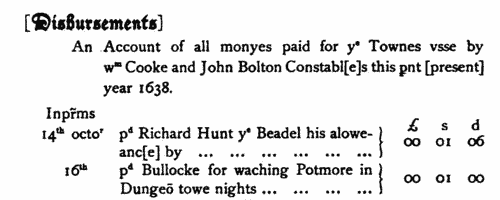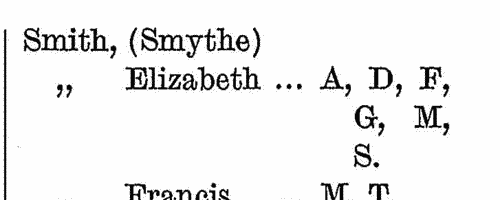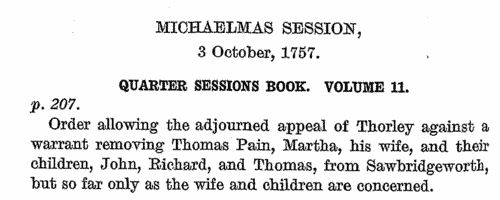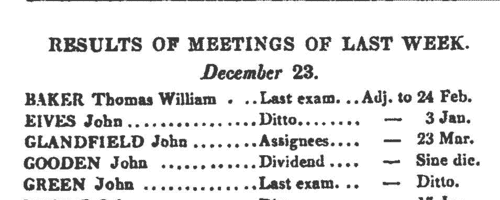Add this eBook to your basket to receive access to all 60 records. Our indexes include entries for the spelling cutmore. In the period you have requested, we have the following 60 records (displaying 1 to 10): These sample scans are from the original record. You will get scans of the full pages or articles where the surname you searched for has been found. Your web browser may prevent the sample windows from opening; in this case please change your browser settings to allow pop-up windows from this site. Inhabitants of Manchester, and travellers
(1633-1666)
The constables' accounts of the manor of Manchester in Lancashire from 1633 to 1647 were edited by J. P. Earwaker and published in 1892. The accounts largely consist of details of disbursements by the constables, and as such include payments to paupers and soldiers with passes to help them on their journeys to and from other parts of the country. Earwaker added nine 'important appendices' to the work: 1. Disbursements and Receipts during the Plague of Manchester, 1605-6 and 1606 (from State Papers Domestic in the Public Record Office); 2. List of the Books of Assessment, Charity Money Accounts, &c., now in the Possession of the Corporation; 3. List of the Inhabitants of Manchester in 1648 (pages 181 to 201); 4. List of the Inhabitants of Manchester in 1651 (202-221); 5. Disbursements of the Constables in 1651-2; 6. List of the Inhabitants of Manchester assessed in 1659 (225-246); 7. A Second List of the Inhabitants of Manchester in 1659 (247-260); 8. List of the Inhabitants of Manchester assessed in 1666 (261-283); and 9. List of Uncommon, Obsolete, and Dialect Words to be found in the Preceding Pages. | Sample scan, click to enlarge

|  Apprentices registered in Suffolk
(1720-1723) Apprentices registered in Suffolk
(1720-1723)
Apprenticeship indentures and clerks' articles were subject to a 6d or 12d per pound stamp duty: the registers of the payments usually give the master's trade, address, and occupation, and the apprentice's father's name and address, as well as details of the date and length of the apprenticeship. There are central registers for collections of the stamp duty in London, as well as returns from collectors in the provinces. These collectors generally received duty just from their own county, but sometimes from further afield. Because of the delay before some collectors made their returns, this register includes indentures and articles from as early as 1719. (The sample entry shown on this scan is taken from a Norfolk return) | Sample scan, click to enlarge

| Inhabitants of Hertfordshire
(1723)
An Act of Parliament of 9 George I required all men aged 18 and over who had not done so previously to swear allegiance. From 17 August to 24 December 1723 the greater part of the men of Hertfordshire attended at various inns in the county to sign the oath of allegiance: women were exempt from the act, but almost as many attended and swore. This list indicates the place of attestation by letters A., B., C., &c., for which there is a key, scans of which are included with the main scan for the surname. | Sample scan, click to enlarge

|  Masters and Apprentices
(1736) Masters and Apprentices
(1736)
Apprenticeship indentures and clerks' articles were subject to a 6d or 12d per pound stamp duty: the registers of the payments usually give the master's trade, address, and occupation, and the apprentice's father's name and address, as well as details of the date and length of the apprenticeship. 2 January to 11 December 1736 | Sample scan, click to enlarge

|  Masters and Apprentices
(1744) Masters and Apprentices
(1744)
Apprenticeship indentures and clerks' articles were subject to a 6d or 12d per pound stamp duty: the registers of the payments usually give the master's trade, address, and occupation, and the apprentice's father's name and address, as well as details of the date and length of the apprenticeship. | Sample scan, click to enlarge

|  Masters of apprentices registered in Suffolk
(1798) Masters of apprentices registered in Suffolk
(1798)
Apprenticeship indentures and clerks' articles were subject to a 6d or 12d per pound stamp duty: the registers of the payments usually give the master's trade, address, and occupation, and the apprentice's name, as well as details of the date and length of the apprenticeship. There are central registers for collections of the stamp duty in London, as well as returns from collectors in the provinces. These collectors generally received duty just from their own county, but sometimes from further afield. The indentures themselves can date from a year or two earlier than this return. (The sample entry shown on this scan is taken from a Bristol return. Each entry has two scans, the other being the facing page with the details of the indenture, length of service, and payment of duty.) IR 1/68 | Sample scan, click to enlarge

| Hertfordshire Sessions
(1752-1799)
Incidents from the Hertfordshire Sessions Books and Minute Books. These cover a wide range of criminal and civil business for the county: numerically, the most cases (362) concerned assaults and rioting, and larceny (378), but there is a large variety of other matter, as extensive as the jurisdiction of the courts. These highly condensed abstracts of the entries were prepared by William le Hardy, and published for the County Council in 1935. | Sample scan, click to enlarge

| Deaths, Marriages, Literary News, Bankrupts, Patents, and Dissolutions of Partnerships
(1823)
English death, marriage and birth notices, bankruptcies, certificates and dividends, dissolutions of partnerships, literary news, and patents, as reported in the European Magazine. Includes some marriages and deaths from Ireland, Scotland and abroad, and Scottish sequestrations (bankruptcies). July to December 1823.
| Sample scan, click to enlarge

| Bankrupts in London
(1824)
English bankrupts could be dealt with in the provinces (Country) or London (Town). Town proceedings covered not only London but many provincial cases. The weekly Law Advertiser printed this London Bankrupt Diary, detailing the progress of Town cases as they went through the various stages of hearings towards the surrender, realisation and distribution of the bankrupt's assets. | Sample scan, click to enlarge

| London Bankruptcy Proceedings
(1824)
English bankrupts could be dealt with in the provinces (Country) or London (Town). Town proceedings covered not only London but many provincial cases. The weekly Law Advertiser included this section entitled Results of Last Week's Meetings, giving date, name (surname first, in capitals), stage of the process (such as last examination, appointment of assignees, dividend) and the prospective date of the next meeting (sine die when the case was, effectively, closed). | Sample scan, click to enlarge

|
Research your ancestry, family history, genealogy and one-name study by direct access to original records and archives indexed by surname.
|












